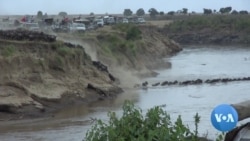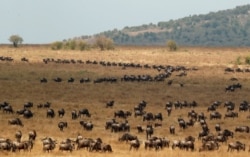The annual great migration of wildlife across Tanzania and Kenya usually attracts thousands of tourists on safari, providing income to people who depend on spending by the visitors — such as souvenir makers. But, as the COVID-19 pandemic has slowed tourism, Kenya's craftsmen and women are suffering. In the city of Narok, women who specialize in beadwork to sell to tourists have seen their incomes drop to a fraction of what they were last year.
Kenya’s Maasai Mara National Reserve normally has almost as many tourists as wildebeests for the annual great migration of wildlife from Tanzania.
But tourism is struggling to recover from the COVID-19 travel restrictions, which were finally lifted in July. Speaking to VOA, Kenya’s Cabinet secretary for Tourism, Najib Balala, says as a result, the projected revenue targets will not be met.
“In the last six months we [tourism industry] have lost almost $800 million in terms of revenue for the government. Definitely we were expecting to have $2 billion revenue for the government from tourism. But, because of the pandemic, that’s a big loss,” he said.
With just a trickle of tourists, many of Kenya’s souvenir sellers remain closed and the craftsmen and women are struggling to make a living.
Noltapari Kisemei is part of the Aitong Women’s Group (AWG). She also heads a collective group of 3,000 beadwork artists all of them women.
They’ve seen their incomes drop to a fraction of the $100 per month average they once earned to help support their families.
"As a leader of the women in this area, most have been expecting answers from me on how to survive the pandemic. I am totally disoriented and helpless on what to tell them and how to weather this storm," she said.
To help the craftswomen get by, local aid groups have been donating food.
Amos Kipeen runs the Mara Discovery Community Empowerment Center (MDCEC), an organization that seeks to develop employment skills of locals.
"When they are also not skilled to have alternatives in life, you know people who have not gone to school, they are very much limited. So, if one door is closed then they have no other way to pursue other opportunities,” said Kipeen.
Samuel Tunai, the governor of Narok county, says his administration is also providing food to around 800 families.
“We had even to go and feed those communities, which are living around the game reserve because they were heavily affected by the loss of business in these game reserves,” he said.
As Kenya’s safari tourism slowly recovers, locals are holding on, hoping one day soon the herds of tourists will again rival those of the wildlife.






